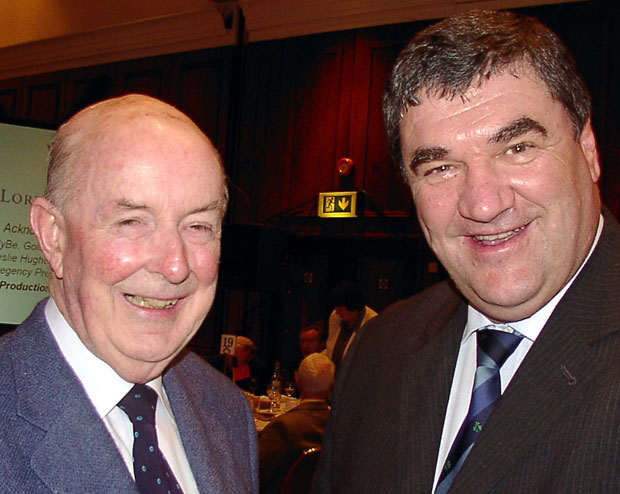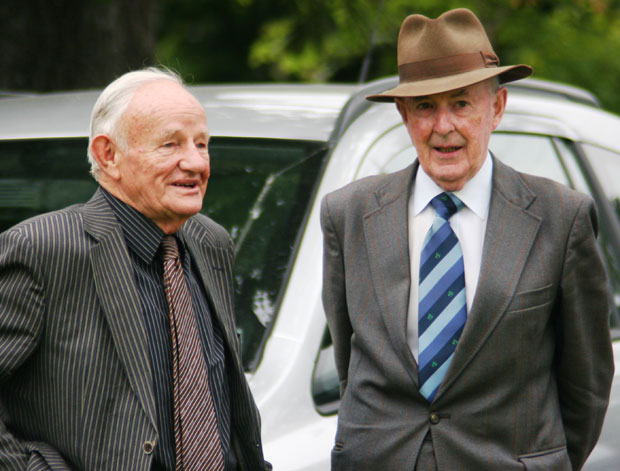When Derek Scott died on 20th July 2015 in his 86th year it was as if a giant oaktree which embraced the cricket world of Railway Union, Leinster, Ireland and abroad had been felled.
Derek's knowledge of cricket and his contribution to it as player, administrator and statistician was phenomenal.
 Derek Scott with Roy Torrens
Derek Scott with Roy Torrens
He first played for a Railway Under 19s team in 1940 while he was a boy in Willow Park school, the preparatory to Blackrock College. His 1st XI senior career was from 1948 to 1966, playing 156 games with modest averages.
His skills were best displayed as captain for Railway's first ever senior league win in 1960, with the team winning 12, drawing 2 and losing only one league game. In those years he played a major part in developing and encouraging the careers of people like Ginger O'Brien, Joey O'Meara and Dessie Byrne.
In later years Derek was an enthusiastic coach and taverner He was on the Railway club committee for many years, being the representative to the Leinster Cricket Union executive from 1948 to 2009.
He was assistant honorary secretary to Jimmy Boucher in the Irish Cricket Union from 1954 and secretary then from 1974 to 1997 when he passed the torch to the late John Wright.
He paved the way for Ireland's admission to the International Cricket Council (ICC) in 1993. The secretary's role in those days covered all arrangements for fixtures and managing the team and travel arrangements and the other logistics of bringing Irish teams abroad and attracting and hosting overseas teams.
Derek forged contacts with the MCC at Lords which led to Ireland playing competitive games for the first time, rather than friendlies, being in the Gillette/Nat West Cup with the English counties from 1980.
This led, through the shrewd leadership and diplomacy of Derek, and later John Wright, to putting Ireland on the world stage with associate membership of the ICC and world cup qualifications.
Derek was elected president of the Irish Cricket Union for 2001 and he won the Leinster Cricket Union Hall of Fame Award in 2007 for his lifetime of service to the game.
He was one of five Irish recipients of the ICC Centenary Medals for volunteers in 2009 and winner of the Railway Union Ernie Banks Cup for outstanding achievement in 1999.
 Derek Scott looks on as Murray Power and John Wright conduct business
Derek Scott looks on as Murray Power and John Wright conduct business
Derek's lifelong hobby was cricket statistics. Through years of research he compiled the records of all Irish internationals from 1854 and Leinster club games from the start of the senior league in 1919.
One can only look back in amazement at the back-breaking way in which he compiled and analysed these games always in his own careful handwriting in large lever-arch ledgers without such 'modern' tools as type-writers, computers and mobile phones.
His analysis of Railway Union records takes up 700 pages and it was the same for all of the other Leinster clubs. He had the assistance of his loving wife Ann whenever typing was required and their home in Foxrock was an Aladdin's cave of books, cuttings, scorecards, autographs, documents and other memorabilia in every room, including the bedrooms.
Derek and Ann were lovers of opera, going to the Wexford Festival every year with great friends like Niall McConnell and Barbara Wallace. A lifelong tee-totaller, he was a private smoker but never in public, stunned at his retirement when Irish players presented him with a large box of cigarettes.
Up to the time of his admission, first to St Vincent's Hospital and then to Beechfield Manor Nursing Home in Shankill, Derek was active in his parish of Foxrock, serving the 10 o'clock Mass every Tuesday and performing numerous activities. In earlier years, he was prominent in the Holy Ghost Boys' Club ('Bosco') in Dun Laoghaire run by the Blackrock College Past Pupils Union from the 1960s.
What have I omitted? The day job. He worked full-time in his fashion importing business amidst all of his crowded cricket life. I remember ladies' scarves from Italy among the cricket documents in his Andrew Street warehouse and he seemed to know all the best places for ties as well. Others of his many friends and players could, without doubt, tell more about his long life.
For instance, the international players could tell many stories of his trips abroad with them. He was very careful with the money and tight about expenses, but in those days before the sponsorship deals which so many now take for granted, there was not any money in the Irish Cricket Union.
 Des Cashell and Derek Scott
Des Cashell and Derek Scott
In his final years at Beechfield it was sad to see the gradual loss of that phenomenal memory which was a cricket encyclopaedia to rival the great yellow-covered Wisden Almanacks of which he had every issue since it was first published in 1864.
Indeed, Dr Murray Power, president of Cricket Ireland, in tribute, noted that Derek 'contributed an article on Irish cricket to Wisden every year from 1957 to 2009, making him Wisden's longest serving contributor'.
He would ask about the old times and names from those years, for instance: 'How many Tanhams are still playing for Railway?' and show surprise and sadness when I replied about many of his old friends who were now dead. He would say: 'Ah, dear, it is a pity nobody told me about that'. He would ask how the teams were doing now, a proud member of Railway Union to the end, which came more suddenly than was perhaps expected. It was not memory loss but cancer which finally took him.
The oaktree may have fallen, but the acorns are aplenty with a new generation of high- tech scorers, statisticians and social media wizards who are building upon the great legacy that Derek created.
